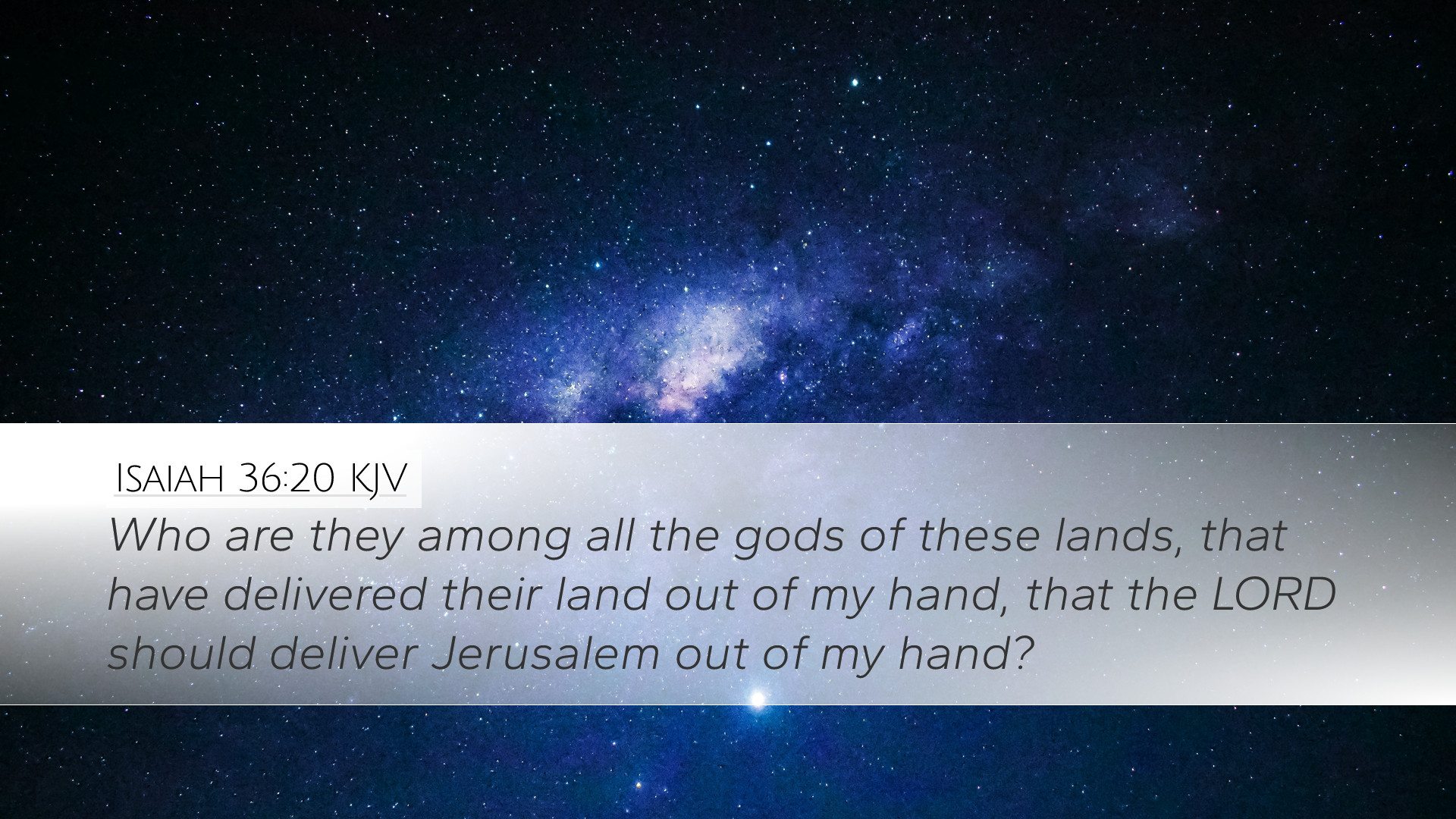Commentary on Isaiah 36:20
Text of Isaiah 36:20 (KJV): "Who are they among all the gods of these lands, that have delivered their land out of my hand, that the LORD should deliver Jerusalem out of my hand?"
Introduction
Isaiah 36:20 presents a powerful challenge from the Assyrian king Sennacherib, aimed at undermining the faith of Jerusalem’s inhabitants. This verse captures the Assyrian perspective on the supremacy of their gods compared to the God of Israel. A detailed examination of this verse through the lens of prominent public domain commentaries reveals profound theological and historical implications for understanding divine sovereignty, the nature of faith, and the context of prophetic literature.
Historical Context
The events surrounding Isaiah 36 are set during the Assyrian siege of Jerusalem, a pivotal moment in Israel's history. Sennacherib, having conquered many cities, turns his attention to Jerusalem. His rhetoric in this verse serves as both psychological warfare and a challenge to the Israelites’ trust in God.
- Matthew Henry: Henry emphasizes the Assyrian king's arrogance as he declares the futility of relying on any god to save Jerusalem. This aspect illustrates the common ancient Near Eastern practice of ascribing military success to the gods of the victor.
- Albert Barnes: Barnes details that Sennacherib’s inquiry reflects a confidence born of previous victories and showcases an ignorance of the true nature of God. He considers the idea that past gods failed to protect their worshippers as a rationale for disregarding the God of Israel.
- Adam Clarke: Clarke notes that this verse signals a confrontation between divine power and human arrogance, where Sennacherib’s perspective is a manifestation of his disbelief in Yahweh’s sovereignty.
Theological Insights
Isaiah 36:20 is rich in theological reflection, particularly regarding the nature of God and the understanding of faith amidst adversity.
- The Sovereignty of God: The challenge presented by Sennacherib underscores a recurring theme in Scripture regarding God’s sovereignty over nations and their gods. Henry points out that despite Sennacherib’s bluster, ultimate divine authority cannot be challenged.
- Faith Amidst Adversity: This verse invites a reflection on the nature of faith. How do believers respond when their faith is questioned? Barnes discusses the courage required to stand firm in one’s beliefs, even when worldly powers seem overwhelming.
- The Nature of Idolatry: Sennacherib’s mockery of the Israelite God showcases a fundamental misunderstanding of true worship. Clarke elaborates on how idolatry relies on the perceived power of false gods, contrasting it sharply with the living God who is actively involved in the lives of His people.
Literary Analysis
This verse is part of a larger narrative that employs a rhetorical strategy aimed at disheartening the people. The taunt blends historical fact with theological challenge, creating a literary moment that calls for reflection on the character of both God and man.
- Rhetorical Question: The use of a rhetorical question indicates the king's contempt and disbelief, serving to assert his own power while attempting to sow doubt in the minds of the people. Barnes highlights that such an approach targets the hearts of the listeners.
- Contrast in Power: The contrast between the power of the Assyrian king and the protective nature attributed to God reveals a dynamic tension in the text. Clarke articulates how this contrast serves as a foreshadowing of God’s eventual intervention.
Application for Today
The insights gleaned from Isaiah 36:20 are pertinent to contemporary readers, especially among pastors, students, and theologians. The revisiting of this narrative in light of its theological themes can serve as a source of encouragement and challenge.
- Encouragement in Trials: Just as the Israelites faced intimidation from an outwardly powerful foe, modern believers also encounter societal pressures that challenge their faith. This commentary serves to remind them of the ultimate sovereignty of God, as emphasized by Henry.
- Understanding Idolatry in Modern Context: The fundamental nature of idolatry, as illustrated by Sennacherib's misplaced confidence, can serve as a mirror for contemporary faith practices. Believers must ensure that their trust rests solely in the one true God, regardless of the 'gods' of modern society. Clarke’s insights are particularly relevant as a challenge to evaluate what influences sway their reliance on God.
- The Call to Strengthened Faith: In times of crisis, this verse serves as a strong exhortation to reaffirm one's faith in God's promises. As Barnes suggests, believers must cultivate a steadfast spirit that does not yield to fear, trusting that God is ultimately in control.
Conclusion
Isaiah 36:20 stands as a significant junction of faith, power, and divine sovereignty. Through the combined insights from revered commentaries, the verse emphasizes the overwhelming, incomprehensible might of God juxtaposed against human arrogance. For pastors, students, theologians, and scholars, this serves as a profound reminder of faith’s resilience amidst trials and the ongoing struggle against doubt and despair. Ultimately, it is through understanding this scripture that believers can draw strength and encouragement for their own journeys of faith.


